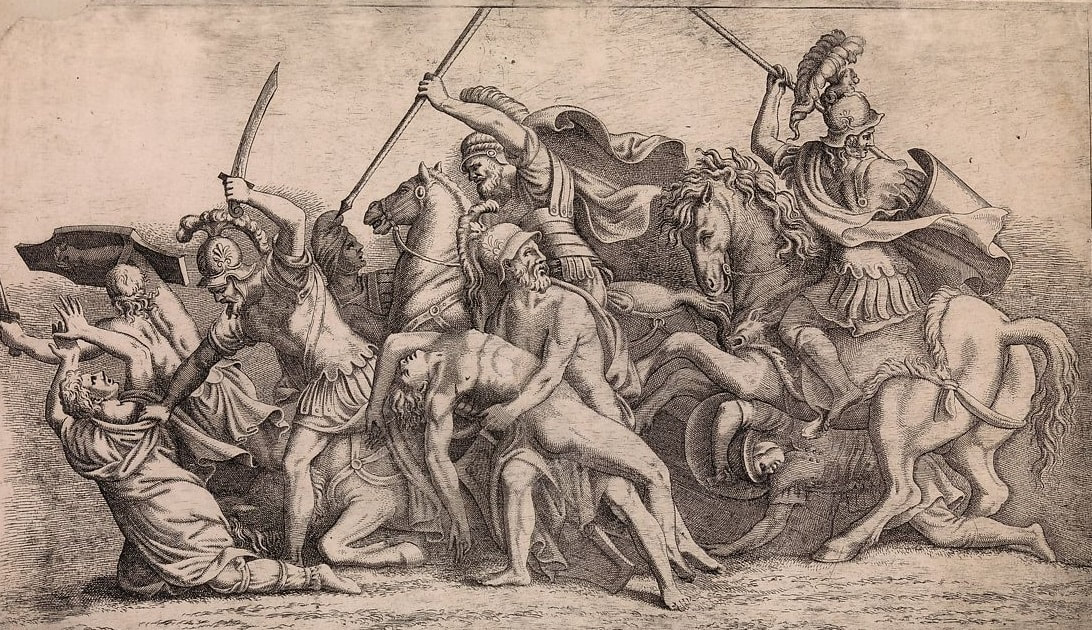MYRMIDONS IN GREEK MYTHOLOGY
Myrmidons in Greek Mythology
The Myrmidons are famous in Greek mythology for being the troops led by Achilles during the Trojan War. As a mythical group of people, the Myrmidons were said to have originally been ants that were transformed by Zeus.
The Myrmidons of Aegina
The name Myrmidons can be translated as “ant-people”, and in Greek mythology, a famous tale tells of the transformation of ants into people on the island of Aegina.
Zeus had abducted Aegina and took her to the island of Oenone to have his way with her (the island being renamed Aegina in honour of Zeus’ lover). From the relationship came forth a son, Aeacus, who would become King of Aegina.
Some say the island was without inhabitants, and some say that all of the population was killed by a plague sent by Hera, in either case, Aeacus was a king with no-one to rule. Aeacus would pray to Zeus, and in response, Zeus transformed the ants on the island into people.
This new population of Aegina were a resilient and tough breed, who showed intense loyalty to their leaders.
Later, Aeacus would exile his two sons, Peleus and Telamon, after they had killed Phocis. Peleus would travel to Phthia with a large group of Myrmidons. Thereafter, the Myrmidons were closely associated with Phthia, more so than Aegina.
Zeus had abducted Aegina and took her to the island of Oenone to have his way with her (the island being renamed Aegina in honour of Zeus’ lover). From the relationship came forth a son, Aeacus, who would become King of Aegina.
Some say the island was without inhabitants, and some say that all of the population was killed by a plague sent by Hera, in either case, Aeacus was a king with no-one to rule. Aeacus would pray to Zeus, and in response, Zeus transformed the ants on the island into people.
This new population of Aegina were a resilient and tough breed, who showed intense loyalty to their leaders.
Later, Aeacus would exile his two sons, Peleus and Telamon, after they had killed Phocis. Peleus would travel to Phthia with a large group of Myrmidons. Thereafter, the Myrmidons were closely associated with Phthia, more so than Aegina.
Myrmidons Descendants of Myrmidon
|
Alternatively, the Myrmidons were descendants of the eponymous Myrmidon.
Eurymedusa was a beautiful princess of Phthia, who caught the eye of the god Zeus. Zeus transformed himself into an ant to lie with the princess, with Eurymedusa being also transformed in some accounts. The result of the liaison was Myrmidon. Myrmidon would marry Pisidice, and become father to Actor, Antiphus, Eupolemia and Hiscilla. |
|
It was in the time of Actor, or of Actor’s son, that Peleus came to Phthia and was welcomed.
Myrmidons and the Trojan War
During the Trojan War, the Myrmidons were said to have come from Phthia in Thessaly, when it was said that Achilles, son of Peleus, aged 15, was given command of them.
During the Trojan War, the Myrmidons were amongst the greatest fighters within the ranks of Achaean forces. The Myrmidons were also intensely loyal to their leaders, and for the majority of the Trojan War this meant Achilles.
Thus, it was, that when Achilles withdrew from the battlefield after his argument with Agamemnon, so did the Myrmidons; and it was during this time that the war went particularly badly for the Achaeans.
After the death of Achilles, the Myrmidons became the loyal troops of Neoptolemus. Named commanders of the Myrmidons at Troy include Alcimedon, Bathycles, Epigeus, Eudorus, Menesthius and Pisander.
During the Trojan War, the Myrmidons were amongst the greatest fighters within the ranks of Achaean forces. The Myrmidons were also intensely loyal to their leaders, and for the majority of the Trojan War this meant Achilles.
Thus, it was, that when Achilles withdrew from the battlefield after his argument with Agamemnon, so did the Myrmidons; and it was during this time that the war went particularly badly for the Achaeans.
After the death of Achilles, the Myrmidons became the loyal troops of Neoptolemus. Named commanders of the Myrmidons at Troy include Alcimedon, Bathycles, Epigeus, Eudorus, Menesthius and Pisander.
|
|
Colin Quartermain - Myrmidons - 25th July 2021
